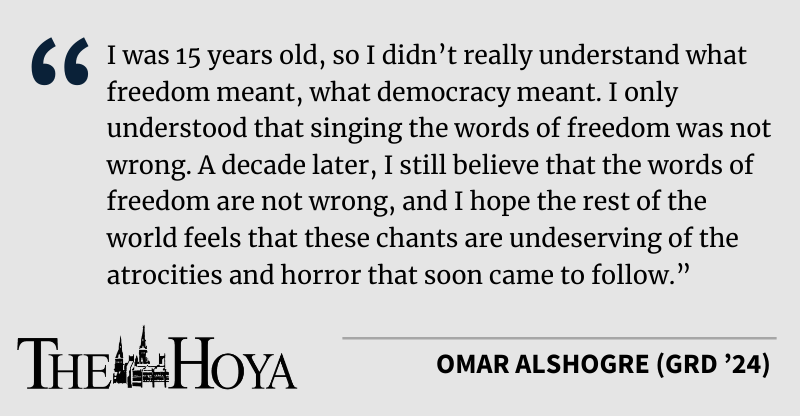This piece discusses violence, police brutality and incarceration. Please refer to the end of the article for on- and off-campus resources.
For people around the world, March represents the changing of the seasons, bringing springtime flowers and new life. However, for Syrians, March 15, 2021, marked one decade since the people first rose up against President Bashar al-Assad’s corrupt regime amid the wave of the Arab Spring.
I will never forget March 18, 2011, the day I joined my fellow Syrians on the streets in Baniyas, singing songs of freedom and liberty. I was 15 years old, so I didn’t really understand what freedom meant — what democracy meant. I only understood that singing the words of freedom was not wrong. A decade later, I still believe the words of freedom are not wrong, and I hope the rest of the world feels these chants are undeserving of the atrocities and horror that soon came to follow.
At these demonstrations, my classmate Alaa was the first of my peers to be shot by a police officer. I was taught in school that the police exist to protect, not harm. Yet they were the ones beating and killing peaceful civilians. It all happened so suddenly that I could not process what was happening. I had never seen anyone killed before, nor could I have imagined seeing so much blood spilled on the streets. That night, I had countless terrifying nightmares that reminded me of Alaa. My father made me go back to school the next day, worried that my grades would slip otherwise. The threat of detention made everybody pretend nothing had happened; people showed up to class on time, and we continued on with the next math unit. Although Alaa was in everyone’s thoughts, I heard nothing but silence. I felt nothing but fear. I had never lost a friend before, and now my mind was consumed by thoughts of him.
On a sunny day nearly a year later, I was sitting in a math class when I heard the heavy footsteps of soldiers marching toward our class. Forcing the doors open with the backs of their guns, they entered our classroom to arrest me for participating in a demonstration the previous night. The teacher scrambled to a corner while the rest of the students ran to another; I dropped to the floor. The intelligence services officers began to jump on me. An officer yelled, “Show me his blood, he needs to be an example for the rest.” Everyone in the class knew a single outcry could cost them their life or their freedom — including the teacher. This arrest was my first time going to prison, simply because I used my voice in an anti-regime demonstration. After this incident, school became a source of fear and danger, so I never returned.
Since then, the war has killed nearly half a million people, wounded more than 1 million and displaced a vast proportion of the country’s population. These numbers include 12,000 children who were killed or injured. The atrocities committed by the Syrian regime during this decade of war led to a severe financial crisis, the largest displacement of refugees since World War II and a country in ruins. The horrors of the war turned my beautiful house into rubble and my wonderful school into dust. A nation that once was a refuge became the largest producer of refugees.
Today, there are nearly 2.45 million children in Syria who are out of school, and many haven’t been to school in ten years. The children of Syria have lost their chance at an education, their best chance at liberation. The Syrian regime has successfully silenced any opposition by imprisoning and murdering Syria’s most highly educated people — people I’ve met in prison. Much of my knowledge comes from the lessons they taught me, but they will never be able to pass on this knowledge to Syria’s next generation of children unless the global community takes action to end the national violence.
I chose to study at Georgetown University because I wanted to join a community engaged in politics that strongly values other people. There is no value in our education if we don’t use it to improve the world. There is no value in our strong community if we do not stand together to fight for others and win back Syria’s lost generation. By pursuing knowledge, we are fulfilling the dreams of many Syrian children, who are relying on us to take this education and help them rebuild their lives and their country.
It is easy to feel confused, hopeless and helpless, but that is not an excuse to do nothing. I encourage my fellow students to learn about and join organizations working on the Syrian cause, such as the Syrian Emergency Task Force, which supports the needs of the Syrian people for freedom and democracy. Anyone can send a “letter of hope” to Syrian children through SETF; even actions as simple as writing a letter will aid the Syrian people and ensure that we as Hoyas do not stand idly by amid the atrocities in Syria. Additionally, all American students can contact their representatives in Congress to remind them Syria is an important issue and urge them to legislate for the protection of civilians and accountability in Syria.
Our Jesuit principle of being people for others calls on us to stand with the Syrian people. You don’t have to be Syrian to care for Syria; it is enough to be human.
Omar Alshogre is a first-year student at Georgetown University.
Resources: On-campus confidential resources include Health Education Services (202-687-8949) and Counseling and Psychiatric Services (202-687-6985 or 202-687-6985 for after-hours emergencies). Off-campus and virtual resources include HoyaWell (24/7 telemental health services) the Washington, D.C. Access HelpLine (1-888-793-4357).










Waail Ramadan • Apr 17, 2021 at 4:26 pm
Thank you for the powerful words. We all most do more.
Sara Huizenga • Mar 19, 2021 at 12:55 am
#NeverAgain is NOW – #ASSadHolocaust